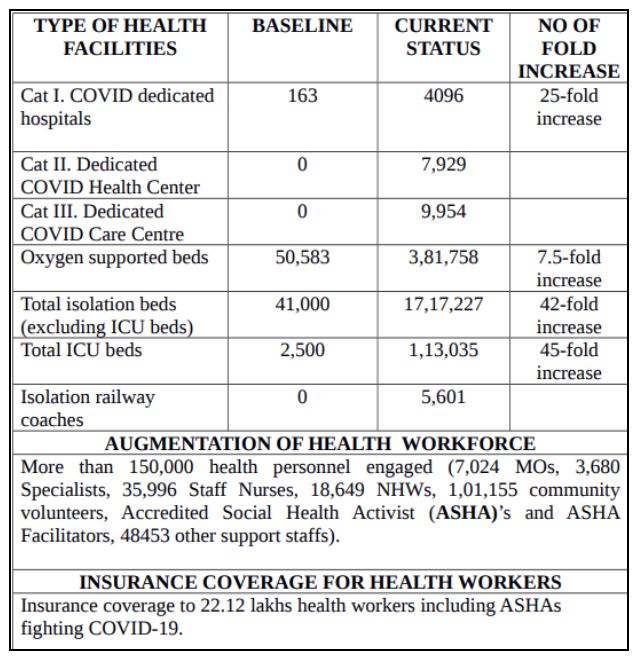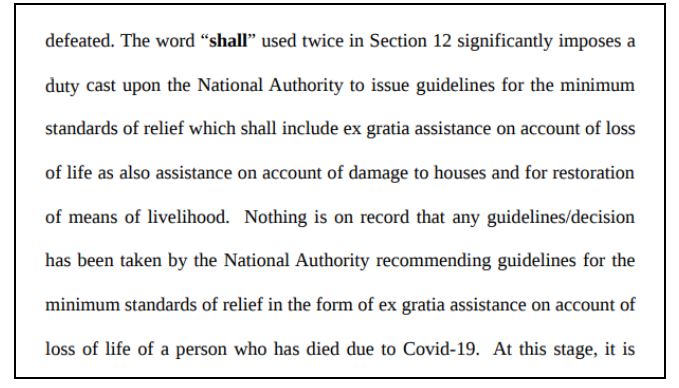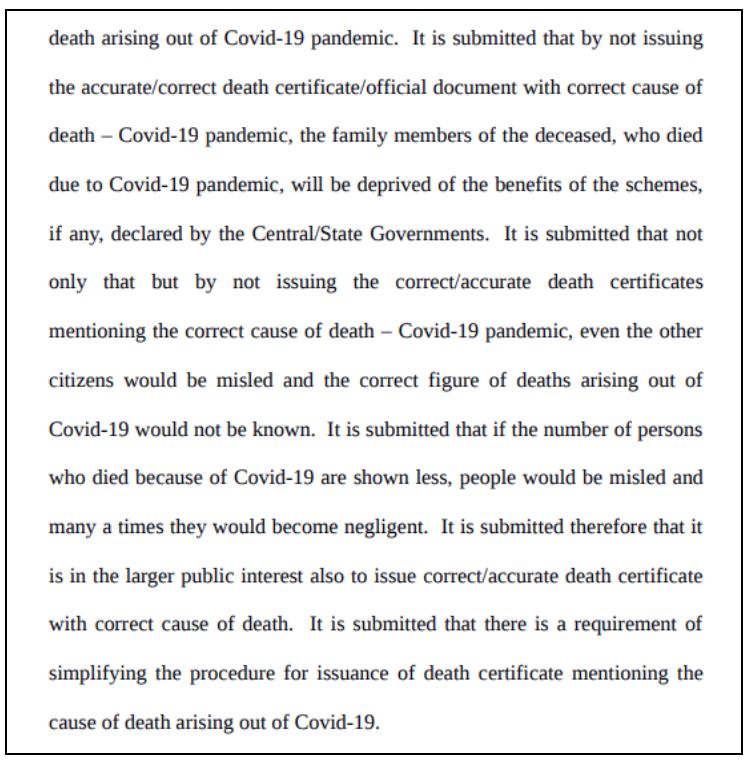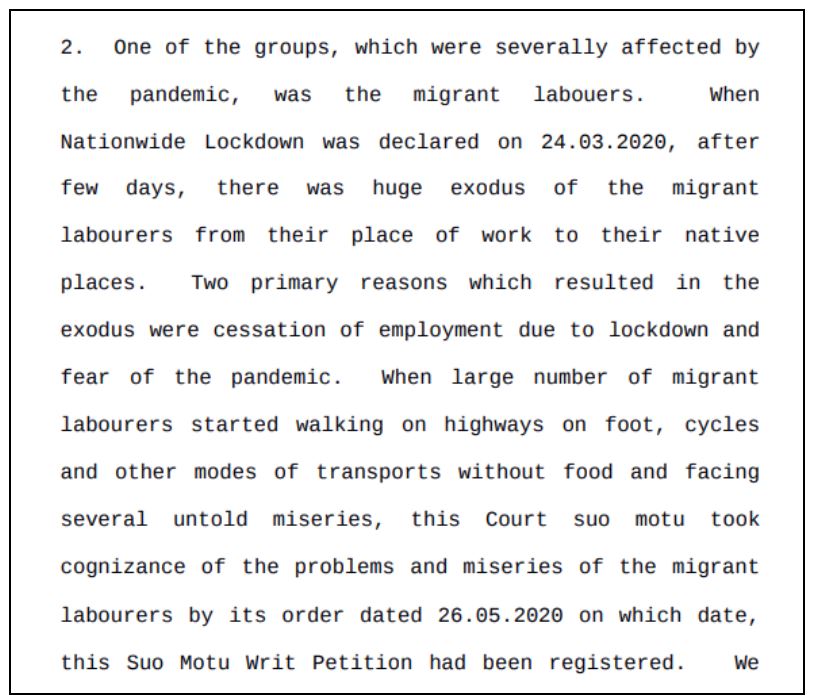In this roundup of important court judgments, we look at constitutional court remarks & directions regarding the State’s obligation to frame guidelines on ex-gratia compensation to families of COVID-19 victims, issuance of death certificate to COVID-19 related deaths, implementation of ‘One Nation, One Ration Card’ scheme. The courts also took note of unfair restrictions placed on unvaccinated people in the state Mizoram.
Supreme Court: NDMA has a statutory obligation to frame guidelines for recommending ex gratia assistance for the victims of the COVID pandemic.
In hearing the plea regarding granting ex gratia monetary compensation to families of COVID-19 victims, the supreme court held that National Disaster Management Authority (NDMA) has a statutory obligation to frame guidelines for recommending minimum ex gratia assistance for the victims of the COVID pandemic.
The court was hearing writ petitions filed in Public Interest seeking ex gratia monetary compensation of Rs. 4 lakhs or notified ex gratia monetary compensation to the families of the deceased who have succumbed to the COVID-19 pandemic, in view of Section 12 of the Disaster Management Act (DMA), 2005. In a previous hearing, the apex court reserved judgement when the Centre informed the apex court that payment of ex gratia compensation to all deceased persons due to COVID-19, is beyond the fiscal affordability of the Governments, as the finances of State Governments and the Central Government are under severe strain, due to the reduction in tax revenues and increase in health expenses on account of the pandemic.
The Central Government submitted that it has adopted a multi-pronged, multi-sectoral approach and that there is a large-scale increase in the health infrastructure during the course of the pandemic. The government submitted the following details to the court.

The Central government thus held that due to the peculiar nature of the COVID-19 pandemic, it was advisable not to formulate a straitjacket guideline and a cast in stone formula on “Minimum Standards of Relief”. The submission also emphasised that the Union of India has taken a conscious policy decision to provide relief depending upon the ever-changing needs through various Ministries/Departments and such actions are coordinated and monitored by the National Executive Committee, as contemplated in the Disaster Management Act, 2005 in general and under Section 10 in particular.
Upon examining all submissions, the court observed that it is required to be noted that some States are paying ex gratia assistance to the family members of the persons who have died due to the COVID-19 pandemic, like the State of Bihar paying Rs. 4 lakhs, Karnataka paying Rs. 1 lakh and Delhi paying Rs. 50,000. However, it is to be noted that the same is paid from the Chief Minister Relief Fund or other relief funds, but not from SDRF.
Therefore, the court held that in order to avoid any discriminatory treatment, it would be appropriate for the National Authority to recommend uniform guidelines while providing for the minimum standards of relief in the form of ex gratia assistance on account of loss of life, as mandated under Section 12 of the Act.

The court recognised that no writ of mandamus can be issued directing the Central Government/State Governments to pay a particular sum by way of ex gratia assistance as the utilization of the fund by the Central Government would depend upon the priorities fixed by them which includes the money/fund to be used for prevention, preparedness, mitigation, recovery, etc. Therefore, what amount is to be paid by way of ex gratia assistance to the family members of the persons who died due to the COVID-19 pandemic should be left to the National Authority/Central Government.
In conclusion, the apex court directed the appropriate authority i.e., National Authority to frame simplified and uniform guidelines within 6 weeks on providing ex gratia assistance to COVID-19 victims.
Supreme Court: Death due to COVID-19 or COVID-Related Complications should be specifically mentioned In Death Certificate
In the same plea regarding granting ex gratia monetary compensation to families of COVID-19 victims, the supreme court held that a death certificate issued in respect of a COVID-19 fatality must clearly specify the cause of death as COVID-19. If a person has died due to any other complications or disease due to COVID-19, then also the death certificate should specifically mention the cause of death as COVID-19.
The plea submitted that it is in the larger public interest also to issue correct/accurate death certificates with the correct cause of death. The plea also highlighted that there is a requirement of simplifying the procedure for issuance of death certificate mentioning the cause of death arising out of COVID-19. The plea submitted that by not issuing the correct/accurate death certificates mentioning the correct cause of death vis-à-vis COVID-19 pandemic would result in the following.
- The family members of the deceased, who died due to the COVID-19 pandemic, will be deprived of the benefits of the schemes, if any, declared by the Central/State Governments.
- Citizens would be misled and the correct figure of deaths arising out of COVID-19 would not be known.

In response to this, the Central government submitted that with respect to the issuance of the correct and accurate death certificates with the correct cause of death due to COVID-19, there is a statutory mechanism and any breach of the guidelines on the same would be a criminal offence as stipulated under Section 188 of the IPC. Under these provisions, any death resulting from COVID-19 shall have to be certified, failing which, everyone responsible (including the certifying doctor) shall be responsible for penal consequences.
The Central government also highlighted that the broad guidelines for appropriate recording of COVID-19 related deaths in India were prepared by the Indian Council of Medical Research (ICMR) and were issued in May 2020 for all States for implementation and subsequently placed on the ICMR website. The office of the Registrar General of India (ORGI) had issued directions/guidelines to the Chief Registrars of all States/UTs during April 2020 to collect and certify the information on the cause of death due to COVID-19 as per two emergency codes created by World Health Organization (WHO) for COVID-19 in the 10th revision of International Statistical Classification (ICD-10) of Diseases and Related Health Problems.
After considering all submissions, the apex court observed that there is a need for simplified procedure/guidelines to be issued by the Central Government and/or appropriate authority for issuance of an official document. The death certificate/official document must be issued to the family members of the deceased who died due to COVID-19 stating the cause of death as “Died due to COVID-19”, including if he/she might have died due to other complications, however, due to COVID-19.
The court added that the guidelines should also provide for a grievance redressal mechanism. If the family member(s) of the deceased who died due to COVID-19 has/have any grievance that in the death certificate the correct/exact cause of death is not mentioned, they must be provided with some remedy to approach the appropriate authority to get the death certificate/official document corrected.
In conclusion, the court directed the appropriate authority to issue simplified guidelines for issuance of Death Certificates/official documents stating the exact cause of death, i.e., “Death due to COVID-19”, to the family members of the deceased who died due to COVID-19.
Supreme Court: States must implement the ‘One Nation, One Ration Card’ scheme by 31 July
In continuance of suo-moto proceeding regarding problems and miseries of migrant workers aggravated due to COVID-19 pandemic, the supreme court issued a slew of directions for the benefit and welfare of migrant workers.
The apex court recognised that one of the groups, which were severally affected by the pandemic, was the migrant labourers. The measures taken by different governments although could not fully ameliorate the conditions of migrant labourers. The court noted that a large number of migrant labourers have again proceeded to their workplace in search of employment since at their native place as they were not able to get suitable employment to sustain themselves.
The judgement highlights that while both the Central Government and the State Governments have floated various schemes for unorganized workers, building and construction workers, the ground reality is that a large number of beneficiaries are deprived of access to these welfare schemes of the Central Government or the State Governments.

In earlier proceeding to this petition, the apex court had issued various directions regarding the registration of migrants and unorganized workers in the common national database so that they can avail of the various statutory welfare schemes, but the judgement notes that the progress has not been satisfactory rather shows lethargy on the part of the concerned Government. The Supreme had also directed States and Union Territories to provide dry rations and community kitchens for migrant workers who are stranded due to the lockdowns imposed in the wake of the COVID-19 pandemic.
In light of these developments, the Supreme Court passed the following directions for the benefit and welfare of migrant workers:
- The Central Government is directed to develop the Portal in consultation with the National Informatics Centre (NIC) for registration of the unorganized labourers/migrant workers. Central Government as well as the respective States and the Union Territories to complete the process of Portal for registration under National Data Base for Unorganised Workers (NDUW Project) as well as implement the same, which by all means may commence not later than 31 July 2021. The process of registration of the unorganized labourers/migrant workers has to be completed at the earliest, but no later than 31 December 2021. All the concerned States/Union Territories and the Licence Holders/Contractors and others have to cooperate with the Central Government to complete the process of registration of migrant workers and unorganized labourers so that the benefits of the welfare schemes declared by the Central Government/State Governments/ Union Territories be available to migrant workers and unorganized labourers for whose benefits the welfare schemes are declared.
- The Central Government, Department of Food and Public Distribution (Ministry of Consumer Affairs, Food and Public Distribution) to allocate and distribute food grains as per demand of additional food-grains from the States for disbursement of dry food grains to migrant labourers.
- States to bring in place an appropriate scheme for distribution of dry ration to migrant labourers for which it shall be open for States to ask for allocation of additional food grains from the Central Government. The State shall consider and bring an appropriate scheme, which may be implemented on or before 31 July 2021. Such a scheme may be continued and operated till the current pandemic (COVID-19) continues.
- The States, who have not yet implemented the “One Nation One Ration Card” scheme is directed to implement the same by not later than 31 July 2021.
- The Central Government may undertake exercise under Section 9 of the National Food Security Act, 2013 to re-determine the total number of persons to be covered under the Rural and Urban areas of the State.
- All the States/Union Territories to register all establishments and license all contractors under the Act, 1979 and ensure that statutory duty imposed on the contractors to give particulars of migrant workers is fully complied with.
- All State/Union Territories are directed to run community kitchens at prominent places where large number of migrant labourers are found for feeding those migrant labourers who do not have sufficient means to procure two meals a day. The running of the community kitchen should be continued at least till the pandemic (COVID-19) continues.
Gauhati HC: Restriction on Unvaccinated Persons for leaving from their Homes, Debarring them from earning livelihood, Violative Of Art 14,19 and 21
In the case Dinthar Incident Aizawl vs. the State of Mizoram, the high court held that placing restrictions on unvaccinated persons by not allowing them to leave their house or pursue livelihood activities is violative of Article 14, 19 and 21.
According to certain clauses of the Standard Operating Procedure (SOP) issued by the state government of Mizoram on 29 June 2021, it requires all persons in the State of Mizoram to be vaccinated or else they would not be allowed to leave their houses to procure essential items or earn their livelihood by working in shops, driving public/commercial transport vehicles, etc.

The high court was adjudicating on the question, with regard to the above clauses, whether a person can be vaccinated against his will and whether the non-vaccination of the said individual can debar him from earning his livelihood, keeping in mind the fundamental right of a person to practice any profession or to carry on any occupation or trade or business under Article 19(1)(g) and his right to livelihood in terms of Article 21 of the Constitution.
The court noted that the submissions clearly show that 33% of the targeted persons are still to be vaccinated. There can be any number of reasons for a person to leave their house, for example, it could be for the purpose of procuring essential supplies, like food, medicines, attending to their near and dear/sick ones, etc. However, the said clause has virtually put them under house arrest in violation of Article 21 of the Constitution of India, while persons who have been given the first dose of vaccine are allowed to leave their houses/compounds.
Therefore, the court observed that with respect to Clause 6(1) and 6(5) of the SOP, there is discrimination at large, as persons who have been vaccinated with the first dose of the vaccine are allowed to earn their livelihood, but not the unvaccinated persons.
The judgement further highlights that even persons who have been vaccinated can still be infected with the virus, which would, in turn, imply that vaccinated persons who are COVID-19 positive, can also spread the said virus to others. It is not the case that vaccinated persons cannot be infected with the virus or are incapable of spreading the virus. Thus, even a vaccinated infected COVID-19 person can be a super-spreader. If vaccinated and unvaccinated persons can be infected by the COVID-19 virus and if they can both be spreaders of the virus, the restriction placed only upon the unvaccinated persons, debarring them from earning their livelihood or leaving their houses to obtain essential items is unjustified, grossly unreasonable and arbitrary.
Due to the above reasons, the court concluded that Clause 6(1) and 6(5) of the SOP are also violative of Article 14 of the Constitution, especially when achieving the target for vaccinating the targeted population may take many more months, in which case unvaccinated persons would be deprived of their right to livelihood, which would, in turn, violate their right to life that is guaranteed under Article 21 of the Constitution.
Featured Image: Compensation to COVID-19 victims


